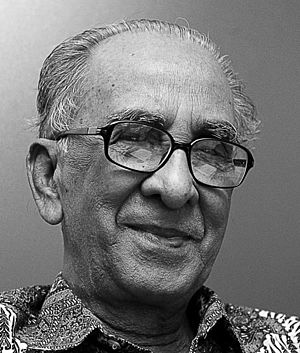Muhammad Habibur Rahman facts for kids
Quick facts for kids
Muhammad Habibur Rahman
মুহাম্মদ হাবিবুর রহমান |
|
|---|---|
 |
|
| Prime Minister of Bangladesh Acting |
|
| In office 31 March 1996 – 23 June 1996 |
|
| President | Abdur Rahman Biswas |
| Preceded by | Khaleda Zia |
| Succeeded by | Hasina Wazed |
| Chief Justice of Bangladesh | |
| In office 1 February 1995 – 30 April 1995 |
|
| Preceded by | Shahabuddin Ahmed |
| Succeeded by | A. T. M. Afzal |
| Personal details | |
| Born | December 3, 1928 Murshidabad, Bengal Presidency, British India (now in West Bengal, India) |
| Died | January 11, 2014 (aged 85) Dhaka, Bangladesh |
| Political party | Independent |
| Alma mater | University of Dhaka University of Oxford |
Muhammad Habibur Rahman (December 3, 1928 – January 11, 2014) was a Bangladeshi politician and jurist. He was the chief justice of the Bangladesh Supreme Court from March 31 to June 23, 1996. He was also the first Chief Advisor of the Caretaker Government of Bangladesh for a month in 1996.
Birth and early life
Born in 1930 in Murshidabad of the then undivided Indian subcontinent (now West Bengal), he completed higher secondary from Kolkata Presidency College. Later, he moved to Rajshahi along his family.
After completing BA honours from Rajshahi College, he took admission in Dhaka University and completed BA Honours (1949) and MA (1951) in History from Dhaka University. He also obtained LLB from the DU and subsequently, BA Honours (1958) and MA (1962) in Modern History from the University of Oxford.
Habibur Rahman began his career as a temporary Lecturer in History of Dhaka University on May 1, 1952. But he had to step down four days later for participating in the Language Movement. He also taught history at Sirajganj College, Jagannath University (formerly Jagannath College).Later he joined Rajshahi University where he subsequently held the office of Dean of the Faculty of Law (1961) and of Reader in History (1962-64).
Legal Arena
Habibur Rahman changed his profession in 1964 when he took to law and joined the Dhaka High Court Bar. In his legal career he held the offices of Assistant Advocate General (1969), Vice President of High Court Bar Association (1972) (now Supreme Court Bar Association) and member of Bangladesh Bar Council (1972).
He served as a Judge of the High Court Division (1976-85), Judge of the Appellate Division of the Supreme Court of Bangladesh (1985-95), Acting Chief Justice (1990-91) and as the Chief Justice of the Supreme Court of Bangladesh (1995). Justice Habibur Rahman retired from service as the Chief Justice of Bangladesh in 1995.
His juristic competence is demonstrated in his opinions and interpretations as pronounced in many of the Bangladesh Supreme Court's decisions concerning vital issues, such as, admiralty jurisdiction, amendment of the Constitution, citizenship, habeas corpus, administrative tribunals and court jurisdictions. However, in 1994, he delivered a controversial verdict in favour of Ghulam Azam that restored citizenship for the former Jamaat-e-Islami chief. He participated in many international conferences of lawyers and jurists including the Conference of Chief Justices of Asia-Pacific in Perth, Australia (1991), Fourth Commonwealth Chief Justices Conference in Abuza, Nigeria (1992), First SAARC Chief Justices Conference in Kathmandu, Nepal (1995).
Scholarly life
A researcher and writer Habibur Rahman has substantial contribution in literature and in varied intellectual arena. The noted scholar authored some 70 books on law, language, literature, Rabindranath Tagore, anthropology and religion. Some of his literary and other noted publications are as follows: Law of Requisition (1966), রবীন্দ্র প্রবন্ধেসঞ্জনা ও পার্থক্য বিচার (Rabindra Prabandhey Sanjna O Parthakya Bichar) (1968), যথা-শব্দ (Jatha-sabda) (1974), মাতৃভাষার স্বপক্ষেরবীন্দ্রনাথ (Matri-bhashar Sapakshey Rabindranath) (1983), কোরআন সূত্র (Qoran-sutra) (1984), বচন ও প্রবাচন (Bachan O Prabachan) (1985), গঙ্গারিদ্ধী থেকে বাংলাদেশ (Gangariddhi thekey Bangladesh) (1985), রবীন্দ্র রচনার রবীন্দ্র ব্যাখ্যা (Rabindra Rachanar Rabindra-byaksha) (1986), রবীন্দ্র কাব্যে, শীল্পে, সঙ্গীত ও সাহিত্যে(Rabindra- kabyey Art, Sangeet O Sahitya) (1986), On Rights and Remedies, আমরা কি যাবো না তাদের কাছে যারা শুধু বাঙলায় কথা বলে (Amara ki Jabo-na Tader Kachhey Jara Shudhu Banglai Katha Baley) (1996).
Justice Rahman was conferred a Bangla Academy award for his contribution to literature in 1984 and the Ekushey Padak in 2007. He is a fellow of the Asiatic Society of Bangladesh; Fellow of the Bangla Academy; Honorary Bencher, Lincoln's Inn.
Political Life
During his time in DU, he had been the vice-president of Fazlul Huq Muslim Hall Students’ Council in 1951 and played a key role in the 1952 Language Movement. He was also arrested on February 21, 1952 along with many others from a procession that was brought out defying the section 144 imposed by the Pakistani ruler.
As the last retiring Chief justice and according to the then new constitutional provision for Caretaker Government, he took oath as the very first Chief Advisor of the Caretaker Government of Bangladesh for conducting the elections of the Jatiya Sangsad (National Parliament) from March 31 to June 23, 1996.
Death
On 11 January 2014, doctors declared him dead on arrival at United Hospital,Dhaka at the age of 84.
See also
 In Spanish: Muhammad Habibur Rahman para niños
In Spanish: Muhammad Habibur Rahman para niños

